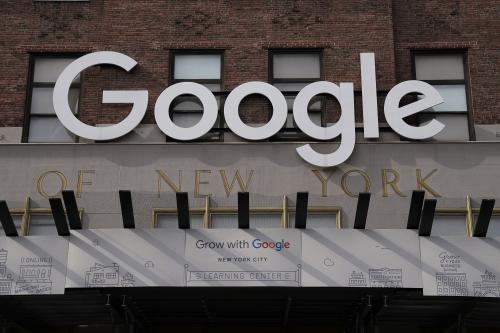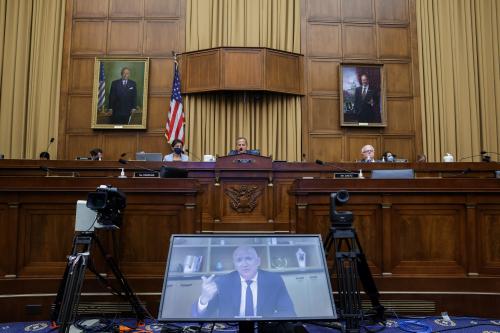In a Medium post several years ago, then-Democratic Presidential-hopeful Sen. Elizabeth Warren proposed measures against unfair business practices by “platform utilities.” She wanted to separate the largest tech platforms from taking part in activity on the platforms they operate and also wanted to require them to meet a standard of fair, reasonable, and nondiscriminatory dealing with their business customers. She also proposed to “unwind” several recent mergers involving digital businesses.
Last week’s proposed antitrust bills introduced with bipartisan co-sponsorship by members of the House Judiciary Committee put many of these ideas into legislative language. Ending Platform Monopolies would prohibit a large platform from owning a line of business that utilizes the platform “for the sale or provision of products or services.” Another bill would impose data portability and interoperability requirements on these platforms. A third proposal would restrict the ability of large platforms to acquire existing or nascent competitors. A fourth draft would impose various non-discrimination and access requirements on platforms. And a final bill would increase filing fees for mergers and would use the revenue to fund antitrust activities.
These procompetitive ideas have been discussed in policy circles for several years now. Some of them were briefly mentioned at the end of last year’s House Judiciary Committee report on its investigation of competition in digital markets. The bipartisan introduction of these bills now suggests that there is some political life to these reforms. But the fragmented nature of the Committee’s move—five separate bills with different proposed remedies—also suggests that political consensus is far away and it may be hard to harmonize the provisions of each of those proposals.
Taken together, these bills have several very promising features. One is the apparent recognition that implementing the proposed measures will take ongoing supervision of the industry through the Department of Justice’s Antitrust Division and the Federal Trade Commission. Another proposal requires the FTC to set up a Bureau of Digital Markets to enforce these pro-competitive measures. The new bureau would mirror the digital markets unit recently established in the United Kingdom’s Competition and Markets Authority. It would have resources and staff “sufficient to carry out [its] functions, powers and duties” and have a director appointed by and reporting to the agency chair.
A second step forward seems to be the understanding that privacy issues will need to be addressed at the same time as these pro-competitive measures are implemented. The mandate for data portability and interoperability, for example, requires platforms to establish privacy and security standards governing access to data for competing businesses and require competing businesses to comply with these standards. It requires that user data cannot be transferred to competing businesses without the “affirmative express consent” of the user and has an extended definition of the notion of affirmative consent. Additionally, it requires the FTC to develop technical standards for data portability and interoperability that “protect data security and privacy.”
The bills also seem to recognize that the courts are a potential obstacle to effective enforcement of these measures. They provide for due process appeals by platforms affected by the measures as implemented but seek to confine court review to interpretation of the law. They do this by stating that in any judicial review of any final agency action under the new law “the findings of the Commission and the Department of Justice as to the facts, if supported by evidence, shall be conclusive.”
But there are a few surprising and substantial omissions. One is a continuing lack of clarity about what the separations requirement means—an ambiguity that is especially serious in electronic commerce—as I pointed out in a previous commentary on Sen. Warren’s earlier divestiture proposal. The text of the proposed statute says only that that a covered company cannot use the platform it operates to sell its own products or services. Some press reports suggest that all this separations requirement would do is ban “private label” offerings by the platform. However, such a ban would do nothing to address the larger conflict of interests between a company like Amazon, which operates its Amazon Marketplace and also acts as a seller of products on this marketplace.
Perhaps the bills intend only to regulate these conflicts through non-discrimination measures. But perhaps, instead, the intent is to force divestiture to require Amazon to operate a platform for merchants or act as an online retailer like Walmart, but not do both. It is crucial to be clear about what is intended. For example, complete divestiture might have questionable benefits for merchants since customers are not likely to patronize an online marketplace that gives them no access to Amazon’s own retail store.
It might make sense to delegate the crucial decision about the nature of this separations requirement to a case-by-case determination by the enforcing agencies. After all, the risks and benefits of banning integration are likely to be different for retail e-commerce, search engines, social media companies, and mobile app stores. But if that is the intent, the authorizing statute should outline the policy issues and provide guiding principles for this agency determination. As it stands, the proposed measure simply hides the key policy choice, leaving it up to the agency or a reviewing court to surface the problem and deal with it as a matter of interpreting an ambiguous statute. It would be far better to be clear that Congress is deliberately delegating this policy choice to an expert agency for determination.
A second omission is the failure to clear up substantial obscurity in the notion of a platform, especially in electronic commerce. Press reports suggest that the only thing that prevents Walmart from being covered is its size, but this might not be the case. The definition of a “covered platform” in the bills seems to suggest that no matter how big Walmart’s online retail store gets it will not be covered. This is because it does not “facilitate” transactions between consumers and “businesses not controlled by the platform.” Walmart’s online retail store acts as the final link in the vertical distribution chain, taking possession of goods obtained from a supplier at wholesale prices and reselling them at a retail rate. It does not provide a service to separate retail merchants seeking to reach their own customers.
If the intent is to exclude all online retailers from the bill and only cover marketplaces that facilitate transactions for independent merchants, it ought to be made much clearer. Clarity on this matter is especially important because it is uncertain how meaningful the contrast is between retailer and marketplace in today’s online world.
Two recent court cases, Bolger and Loomis, for instance, have interpreted Amazon’s position as a platform operator to provide no immunity from product liability suits, ruling that the company has a “pivotal” place in the “chain of distribution” between customer and third-party merchants, regardless of whether it is called a “retailer,” “distributor,” or merely “facilitator.” Amazon supported a California bill, which died last year in the California Senate, that would have codified these ruling, provided that the bill included “all online marketplaces regardless of their business models.”
The distinction between retailer and marketplace might not be so crucial for competition policy either. Walmart is a giant force in online commerce and has substantial ability to abuse its position there. Moreover, it unquestionably provides some online competition to Amazon from the point of view of retail customers. It might be better to bring such a major actor in online commerce under the umbrella of the special pro-competition measures for digital industries.
Furthermore, Walmart runs its own small multi-seller online marketplace, and so provides an alternative from the point-of-view of merchants seeking to reach their customers. So, there is little reason to exclude Walmart from the new measures to deal with digital industries and leave competition concerns it might raise to the standard toolkit of antitrust policy. This issue merits further discussion when Congress holds its legislative hearings on these bills. The issue should not be buried in ambiguous definitions that implementing agencies and reviewing courts will have to deal with for years.
A third surprising omission is the lack of any guidance as to how enforcers should consider possible interference between measures to promote competition and measures to achieve good content moderation in social media. It is unclear exactly how interoperability would work under the bill. This is properly left to the implementing agencies to work out on a case-by-case basis. But if wrongly implemented, interoperability could allow competing social media platforms like Parler or Gab to lob messages to Facebook and Twitter users that would violate these platforms’ rules against hate speech and disinformation.
Perhaps, the bill intends to cover these issues through an injunction to advisory technical committees to suggest standards to the FTC that would prevent the use of data portability or interoperability measures for “fraudulent, malicious, or abusive activity by a competing business.” But this is a very thin reed on which to hang such an important issue. When Congress examines the bill as the legislative process moves forward, perhaps it should be modified to contain an injunction directly to the implementing agencies to mitigate the risk that data portability and interoperability might enable content moderation avoidance.
A final omission is the lack of any coordinating mechanism or overarching principles to address potential conflicts or synergies between the pro-competition measures in the bill and other important public policy goals such as privacy and good content moderation. As mentioned, while the bills miss the content moderation issues, they recognize the adjacent privacy issues. But the bills give no institutional guidance to the Department of Justice’s Antitrust Division, which has no pre-existing privacy mission, on how to take privacy concerns into account. The FTC does have an important privacy role through its consumer protection division as well as a mission to preserve competition. For this reason, it might be well-positioned to achieve outcomes that balance both policy objectives. But the way in which the policy objectives might be made to cohere is not spelled out and there is no requirement for regulatory cooperation with DOJ, even to coordinate bureau activity in the same agency.
The United Kingdom is perhaps the furthest along in this area of needed regulatory cooperation. It has assigned the different policy objectives to different agencies. Ofcom, its media regulator, has responsibility for enforcing its new online safety law. ICO, the country’s privacy regulator, is responsible for requiring digital companies, and others, to follow good privacy practices. The digital markets unit in the Competition and Markets Authority implements the new requirements for digital industries.
In addition to this assignment of regulatory responsibilities, the U.K. has also established a mandatory cooperation arrangement. To coordinate enforcement activities, locate and exploit synergies and complementarities where a single policy measure might advance multiple goals, and mitigate, reduce or avoid measures that might exacerbate tensions among the policy objectives, the U.K. has set up a Digital Regulation Cooperation Forum for the three agencies focused on competition, privacy and content moderation. One result of this collaborative institutional arrangement has already been released—a joint statement from the competition regulator and the privacy regulator on competition and data protection in digital markets.
A danger in the U.S. is that legislation will proceed on separate tracks in throwing different regulatory nets around digital industries for competition, privacy, and content moderation. This would lead to a substantial risk of regulators creating silos and working at cross-purposes with one another. The risk of regulatory fragmentation can be mitigated through proper institutional arrangements and congressional guidance. My own view, outlined here, is that a single regulatory agency is the best position to take advantage of the policy synergies and avoid the policy tensions. But a thoughtful institutional coordinating mechanism can only be put in place if policymakers are aware of the danger of regulatory disarray and take explicit steps to guard against it.
Amazon and the Walmart Foundation are general, unrestricted donors to the Brookings Institution. The findings, interpretations, and conclusions in this piece are solely those of the authors and not influenced by any donation.
The Brookings Institution is committed to quality, independence, and impact.
We are supported by a diverse array of funders. In line with our values and policies, each Brookings publication represents the sole views of its author(s).







Commentary
The House pro-competition bills are a good start to mitigate unfair platform practices
June 16, 2021